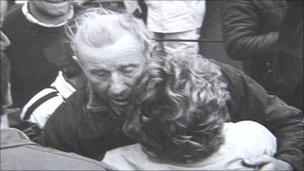Ministers support calls to save Bangor Coastguard
- Published
The first and deputy first ministers are supporting calls to keep coastguard services in Northern Ireland.
Peter Robinson and Martin McGuinness will visit Bangor coastguard on Thursday morning to call for it to remain open.
It is an issue that has united all of the main parties in NI.
A Westminster government consultation is under way on the plan to close 10 of the UK's 18 round the clock centres, including the one at Bangor.
The coastguard station in Bangor is responsible for initiating land air and sea searches, including inland waters across the whole of Northern Ireland.
It also works closely with the Irish Coastguard.
Under Westminster proposals five sub-centres would operate only during daylight hours in Swansea, Falmouth, Humber, either Bangor or Liverpool, and Stornoway or Shetland.
Three 24-hour centres would remain in Aberdeen, Dover and the Southampton/Portsmouth area.
Diana Gadd is a former watch manager with HMS Coastguard in Bangor.
She worked at HMS Coastguard for 25 years before retiring and said if the service was moved local knowledge could be lost.
"Loss of life"
"There is the obvious difficulty with regional accents and local place names, sometimes we have difficulty ourselves understanding local mayday or 999 calls and it would be virtually impossible for someone at a remote station to do what was being asked of them.
"It could certainly lead to loss of life, that's the bottom line."
Bill Tennant from Belfast was lost at sea for 27 hours, adrift in a small rowing boat off the north coast in 1988.
The champion golfer left Portballintrae to go fishing and the motor in his boat cut out.

Bill Tennant from Belfast reunited with his wife after being lost at sea for 27 hours in 1988 (Picture courtesy of Coleraine Chronicle)
He was remarkably found more than a day later alive, a short distance off the coast of Scotland in gale force eight winds.
The 73-year-old said if it was not for a locally based coastguard officer insisting to extend the search for him by three hours he would not be alive today.
He had this message for the Shipping Minister Mike Penning.
"I would say Sir until you know what fear is, do not restrict these men because they are doing a job that no-one else in the world could do. They know the sea they know their own areas," he said.
Local knowledge
"They know the people in the areas and they know the tides and the changes and variations of the wind and the waves and they don't learn that in the books.
"The value cannot be put on their knowledge and if it saves one or 100 lives, the men that do it are the coastguard and the RNLI.
"I think it would be disastrous if for economic reasons these men were restricted or stood down. How much is a live worth?"
Former coastguard officer Brett Cunningham, was the duty senior officer responsible for extending the search for Mr Tennant.
He was in HMS Coastguard for more than 37 years.
"Every maritime incident is almost unique so there is no plan preconceived.
"The coastguard has to work out what the difficulty is, where the person might be, what search units are required because very often it is not just a matter of going straight to the incident, we don't have post codes in the water so they have to work out a search plan search for the people to be rescued, sometimes in very adverse conditions."
Shipping Minister Mike Penning had been due to attend the event in Bangor but his visit had to be postponed.
A spokesman in his department said the consultation will end on 24 March and a final decision will be announced when the responses have been fully considered.